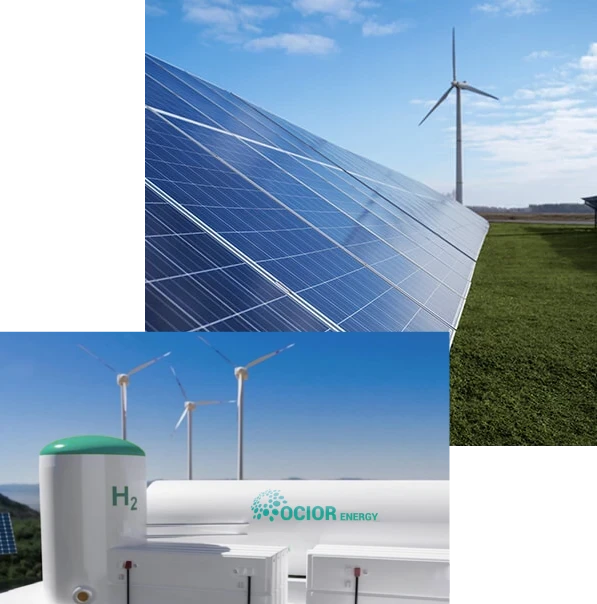

Climate change is a global crisis and represents an existential challenge for the world. As the world transitions to a low-carbon energy future, it must meet the challenges of decarbonising all sectors while ensuring clean, reliable, and affordable energy supplies.
Given the limited alternative energy options, countries worldwide are looking towards developing low-carbon technologies, including hydrogen, as a potential solution to improving long-term sustainability and versatility of their energy supplies. We at Ocior are at the heart of this transition through our net-zero green hydrogen solutions.
Grey hydrogen is produced using fossil fuel energy sources which is converted into hydrogen and CO₂ at high temperature. In the process, the CO₂ is released into the atmosphere, increasing the greenhouse gas effect. Grey hydrogen is therefore not CO₂ – neutral.
Blue hydrogen, like grey hydrogen, is produced from hydrocarbons. However, the CO₂ is captured and stored underground. In the case of blue hydrogen, no additional CO₂ is released into the atmosphere.
Production of green hydrogen is CO₂ free. The electricity for the electrolysis of water comes from 100% renewable energy sources i.e wind and solar. This means that no harmful greenhouse gases are released into the environment.
At Ocior we develop, build, own and operate Green Hydrogen and Green Ammonia facilities including the Renewable Energy needed to generate these green fuels. This makes us a truly 360 degree Green Hydrogen and Green Ammonia producer and supplier.

Deploy 4 GW of sustainable Green Hydrogen capacity by 2030
Accelerate commercially viable transition from fossil fuels to Green Hydrogen

Green Hydrogen can easily decarbonise sectors such as shipping and transportation by acting as a fuel replacement and storage solution. Also, in the chemical and steel manufacturing industries it can act as an emission reduction agent. It has the potential to replace fossil fuels for power generation and store large amounts of renewable energy for domestic use as well.




OCIOR is committed to three of the UN’s Sustainable
Development Goals – SDG 7, SDG 9, SDG 13.
At Ocior, we wish to touch and improve the lives of millions of people. We focus particularly on United Nation’s SDG 7 – Affordable and Clean Energy, and are working to achieve this through the power of zero emission Green Hydrogen.
Climate change is a global crisis and represents an existential challenge for the world. As the world transitions to a low carbon energy future, we are working to meet the challenges of decarbonising all sectors while ensuring a clean, reliable, and affordable energy supply.

To produce hydrogen, its atoms need to be decoupled from other elements with which they occur – in water, plants, or fossil fuels. Green Hydrogen is produced by passing electricity (sourced from 100% renewable sources) through water molecules, which splits H₂O into 2H₂ and O₂ molecules. This Hydrogen can be stored and used as and when required.
Green Ammonia is a derivative fuel made from Green Hydrogen. It is the carrier of choice for transporting green hydrogen due to its higher energy density compared to liquid hydrogen.
Ships can switch to green hydrogen and ammonia, both fuels produced from renewable sources of energy – this transition is attracting attention globally and is in its experimental/developmental phase. There is tremendous research underway for hydrogen technology in aviation, and leading players such as Airbus are likely to carry out testing hydrogen fuelled planes soon.
It is the availability of large swathes of land with solar and wind potential for lowest LCOE (Levelized Cost of Energy), along with port and grid access and proximity to North American, Asian, and European markets.